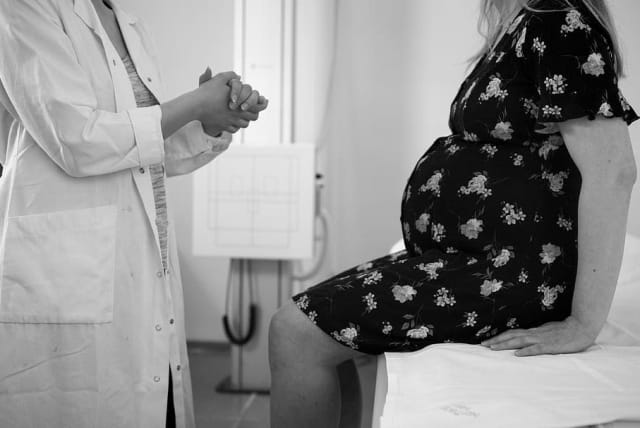Trying to get pregnant? Here's what you should and shouldn't put in your body

A senior clinical dietitian explains why it's important to take supplements at these times and which ones are necessary.
Being pregnant is exciting, yet it requires a lot of resources from the body to create this new life and develop the fetus. Among many women before becoming pregnant, the question arises as to how and if it's possible to work with one's body to provide a safe environment for the baby to grow.
This February, the Health Ministry is marking Healthy Pregnancy Planning Week and to mark this occasion, so here is an important refresher on the medical guidelines regarding nutrition during pregnancy.
The Israel Society of Obstetrics and Gynecology and the Health Ministry published guidelines on nutrition based on significant research evidence and it's important that women know their main medical recommendations.
Pregnancy is actually a period of the first 1,000 days, which are the first three years, covering the nine months of pregnancy and the first two years of the baby's life. During this period, nutrition is of great importance, in light of its effect on growth, the development of the baby and the brain, immune system, function, etc. So, nutrition during pregnancy is of great significance, both in the short and long term.
Iron in pregnancy
During pregnancy and breastfeeding, a woman's body needs a larger amount of iron than usual, which in most cases isn't provided by diet alone. A lack of iron can lead to maternal anemia, which can cause complications such as premature birth and slower fetal growth.
It's recommended to consume an iron supplement from the end of the third month of pregnancy until six weeks after giving birth, 30 mg every day.
In addition to taking iron, one must eat foods rich in iron. It's recommended to separate the consumption of iron supplements and foods rich in iron from dairy products, coffee and tea. Taking iron together with foods rich in vitamin C, such as citrus fruits, increases its absorption in the digestive system.
Folic acid supplement
Folic acid is essential for the proper formation of DNA in the body, and is really important for the developing fetus. During her fertile years, a woman is recommended to take 400 mcg of folic acid.
Taking folic acid before becoming pregnant and during the first trimester reduces the risk of the fetus developing nervous system defects like spina bifida. In addition to taking a supplement, it is recommended to eat foods rich in folic acid such as legumes, citrus fruits and green leafy vegetables.
Iodine and pregnancy
The importance of iodine during pregnancy is backed up by many studies published in recent years, so much so that the recommendation on iodine supplementation during pregnancy also appears in the recommendations of the Health Ministry in Israel and other countries.
Sufficient intake of iodine during pregnancy is essential for the production of thyroid hormones and the functioning of the thyroid gland.
A lack of iodine can cause under activity of the thyroid gland, damage to the production of thyroid hormones and even the intellectual development of the fetus. Even a mild deficiency during pregnancy, infancy and childhood can cause damage to the developing brain and nervous system and reduce the cognitive capacity of kids of school age and even later.
The body absorbs more iodine during pregnancy due to an increase in the production of thyroid hormones and increased clearance of iodine by the kidneys during pregnancy. It's recommended to take iodine in a dose of 150-250 micrograms at least one month before the woman plans to conceive.
The recommended intake of iodine during pregnancy is 220 micrograms and during breastfeeding 290 micrograms per day. With this large of an amount it's often necessary to take nutritional supplements during this period. Check via blood work that your iodine intake during pregnancy is sufficient.
Vitamin D
Vitamin D is a fat-soluble vitamin that our bodies produce when exposed to the sun, and is also found naturally in a few foods. It's needed for bone growth, immune system functioning and more.
During pregnancy, it's recommended to take vitamin D in a dose of 200 - 400 international units.
Calcium in pregnancy
A sufficient amount of calcium is necessary for the normal development of the fetal skeleton. The recommended calcium intake for women during pregnancy and breastfeeding is 1000 mg.
One should eat foods rich in calcium such as dairy products, green vegetables, legumes and nuts.
Beyond maintaining a proper diet, there are habits that are important to avoid during pregnancy:
Weight gain during pregnancy
We tend to think that during pregnancy the mother eats for two, and there's some truth in that: as mentioned, nutrition during pregnancy is very significant. However, it should be noted that one's diet should be balanced and measured.
Adjusted intake reduces the risk of pregnancy complications such as hypertension, preeclampsia, gestational diabetes and premature birth. The recommended range for weight gain during pregnancy depends on the mother's weight before the start of pregnancy.
Smoking
Smoking during pregnancy has serious consequences for the mother, the course of pregnancy and the newborn baby. Smoking is related to infertility, high blood pressure, asthma, and other conditions that affect the pregnancy and the fetus.
Smoking during pregnancy increases the risk of severe pregnancy complications. Stopping smoking has a decisive effect on the health of the mother and the baby.
Drinking
Alcohol consumption by the mother during pregnancy also has many negative and irreversible effects on the fetus. Drinking alcohol during pregnancy increases the risk of damage to fetal brain development, growth disorders and more.
The higher the alcohol consumption, the higher the risk. Because research hasn't shown if there's actually a safe amount to drink while pregnant, one must abstain from alcohol when trying to conceive, through pregnancy and while nursing.
Jerusalem Post Store
`; document.getElementById("linkPremium").innerHTML = cont; var divWithLink = document.getElementById("premium-link"); if (divWithLink !== null && divWithLink !== 'undefined') { divWithLink.style.border = "solid 1px #cb0f3e"; divWithLink.style.textAlign = "center"; divWithLink.style.marginBottom = "15px"; divWithLink.style.marginTop = "15px"; divWithLink.style.width = "100%"; divWithLink.style.backgroundColor = "#122952"; divWithLink.style.color = "#ffffff"; divWithLink.style.lineHeight = "1.5"; } } (function (v, i) { });

